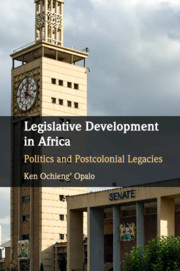Book contents
- Frontmatter
- Dedication
- Contents
- List of Figures
- List of Tables
- Preface
- Acknowledgements
- 1 Introduction
- 2 Legislative Development in Africa
- 3 Intra-Elite Politics and Credible Commitment
- 4 Colonial Origins of Parliaments in Kenya and Zambia
- 5 Elite Control and Legislative Development
- 6 Legislative Institutionalization in Time
- 7 Electoral Politics and Legislative Independence
- 8 Conclusion
- References
- Index
1 - Introduction
Published online by Cambridge University Press: 17 June 2019
- Frontmatter
- Dedication
- Contents
- List of Figures
- List of Tables
- Preface
- Acknowledgements
- 1 Introduction
- 2 Legislative Development in Africa
- 3 Intra-Elite Politics and Credible Commitment
- 4 Colonial Origins of Parliaments in Kenya and Zambia
- 5 Elite Control and Legislative Development
- 6 Legislative Institutionalization in Time
- 7 Electoral Politics and Legislative Independence
- 8 Conclusion
- References
- Index
Summary
This chapter situates the study of legislative development in postcolonial (autocratic) states in historical context. It begins by noting that very little research exists to explain the divergent outcomes in levels of legislative development, institutionalization, and strength in low-income emerging democracies – many of which are former colonies. Instead, much of our knowledge of the evolution and development of legislatures (and inter-branch relations in general) is informed by theories and empirical research on the high-income established democracies of Western Europe and North America. The core argument of this chapter is that postcolonial legislative development was different from the experience in Europe and North America. European legislatures emerged organically to reflect prevailing political economies and intra-elite balance of power between kings and barons (who had the power of the purse). Postcolonial legislative development was different. Having been created ex-nihilo, postcolonial legislatures were marked by significant levels of executive-legislative power imbalance. Importantly, chief executives’ control over resources made postcolonial legislatures not function as checks on executive power (they lacked the power of the purse), but as dependent extensions of the executive. These differences call for a new theory of legislative development (under both autocracy and democracy) in postcolonial contexts.
Keywords
- Type
- Chapter
- Information
- Legislative Development in AfricaPolitics and Postcolonial Legacies, pp. 1 - 30Publisher: Cambridge University PressPrint publication year: 2019

